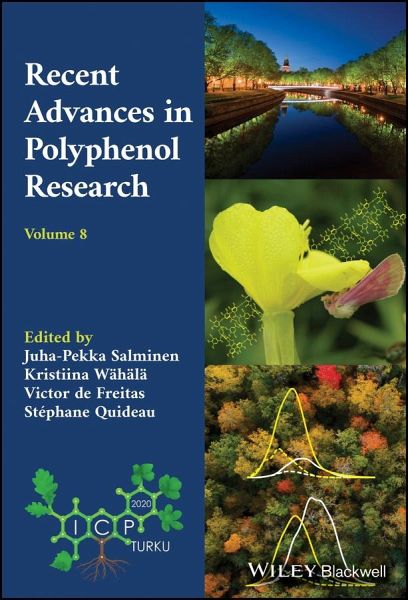
Recent Advances in Polyphenol Research, Volume 8
Versandkostenfrei!
Versandfertig in über 4 Wochen
180,99 €
inkl. MwSt.
Weitere Ausgaben:

PAYBACK Punkte
90 °P sammeln!
Plant polyphenols are specialized metabolites that constitute one of the most common and widespread groups of natural products. They are essential plant components for adaptation to the environment and possess a large and diverse range of biological functions that provide many benefits to both plants and humans. Polyphenols, from their structurally simplest forms to their oligo/polymeric versions (i.e. tannins and lignins), are phytoestrogens, plant pigments, antioxidants, and structural components of the plant cell wall. The interactions between tannins and proteins are involved in plant defe...
Plant polyphenols are specialized metabolites that constitute one of the most common and widespread groups of natural products. They are essential plant components for adaptation to the environment and possess a large and diverse range of biological functions that provide many benefits to both plants and humans. Polyphenols, from their structurally simplest forms to their oligo/polymeric versions (i.e. tannins and lignins), are phytoestrogens, plant pigments, antioxidants, and structural components of the plant cell wall. The interactions between tannins and proteins are involved in plant defense against predation, cause astringency in foods and beverages, and affect the nutritional and health properties of human and animal food plants.
This eighth volume of the highly regarded Recent Advances in Polyphenol Research series is edited by Juha-Pekka Salminen, Kristiina Wähälä, Victor de Freitas, and Stéphane Quideau, and brings together chapters written by some of the leading experts working in the polyphenol sciences today. Topics covered include:
_ Structure, reactivity and synthesis
_ Bioactivity and bioavailability
_ Metabolomics, targeted analysis and big data
_ Quality control & standardization
_ Biogenesis and functions in plants and ecosystems
_ Biomaterials & applied sciences
Distilling the most recent and illuminating data available, this new volume is an invaluable resource for chemists, biochemists, plant scientists, pharmacognosists and pharmacologists, biologists, ecologists, food scientists and nutritionists.
This eighth volume of the highly regarded Recent Advances in Polyphenol Research series is edited by Juha-Pekka Salminen, Kristiina Wähälä, Victor de Freitas, and Stéphane Quideau, and brings together chapters written by some of the leading experts working in the polyphenol sciences today. Topics covered include:
_ Structure, reactivity and synthesis
_ Bioactivity and bioavailability
_ Metabolomics, targeted analysis and big data
_ Quality control & standardization
_ Biogenesis and functions in plants and ecosystems
_ Biomaterials & applied sciences
Distilling the most recent and illuminating data available, this new volume is an invaluable resource for chemists, biochemists, plant scientists, pharmacognosists and pharmacologists, biologists, ecologists, food scientists and nutritionists.




